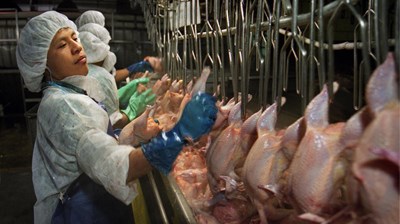
Most Americans are not aware that the recall of meats from large industrial meatpackers is voluntary only. Generally these recalls involve thousands of tons of “product,” because it is all ground or processed together in vast batches in industrial factories.The Food and Drug Administration actually lacks the authority to issue recalls: thus every time we hear of a meat recall, it is termed “voluntary.”
The truth is, like so many other huge corporate powerbrokers, our meat industry pays hefty sums to lobbyists, and fights the government with high-paid lawyers, to exempt itself from government oversight. Meanwhile, these same interests which dominate our food industry influence the federal government to pass laws, or offer money to state agriculture departments, to impose restrictions on small local meat producers like me. Vermont’s Agency of Agriculture, Food and Markets (VAAFM) has in recent years pushed for laws which restrict Vermont on-farm slaughter to five cows annually (increased last year from three), and we small farmers are prohibited by law from selling halves of cows to our customers unless they are shipped and processed at a government-inspected slaughterhouse.
There has never been a Vermont on-farm slaughter recall, because no one has ever been made sick from local meat by the nasty e coli that thrive in the large industrial meat production and packing industries. In New York State, farmers can slaughter and sell quarters of animals on-farm, and even process them there. (That is, butcher the carcass into component cuts after slaughter). VAAFM insists that federal law mandates the restrictions it has imposed -- but apparently no one told New York. In truth, our Legislature and VAAFM have made a bargain with the federal devil, to indirectly benefit large corporate influences who do not want Vermont small farms to cut into their profitable oligopoly.
The current campaign to “defend” illegal farm workers is designed not to protect illegal aliens, but corporate profits. For thirty years, corporate America has favored illegal immigrant labor over American workers -- these workers work for less, they are not unionized, they do not burden employers with health insurance or other costs, and they do not complain when oppressed. This is now obvious in Vermont’s large confinement dairies, where both political parties vie to “defend” these workers: the Left in its naivete that it is protecting these people by perpetuating their enslavement; the Right by crowing that our “farm industry” cannot endure the loss of its cheap labor.
This growing nationwide trend is quite visible in the meat-packing “industry.” Tyson Foods was indicted for conspiring with smugglers to illegally recruit and then hire illegal immigrants for its factory floors (“Meatpackers’ Profits Hinge on Pool of Immigrant Labor,” The New York Times, David Barboza, December 21, 2001). The article cited relates that the purpose of such practices is that “ ''In the communities where these plants are located there isn't an alternative work force. They'd have to raise wages and improve the conditions.'' Professor Heffernan, at the University of Missouri, said it was simple: ''It's the race to the bottom; it's just the race to the bottom. Companies started breaking the unions, moving the plants to rural areas and hiring immigrants a long time ago.'' ”
The 2001 New York Times article reported:
Until 15 or 20 years ago, meatpacking plants in the United States were staffed by highly paid, unionized employees who earned about $18 an hour, adjusted for inflation. Today, the processing and packing plants are largely staffed by low-paid non-union workers from places like Mexico and Guatemala. Many of them start at $6 an hour….Companies like Tyson, Smithfield Foods and Conagra have profited from paying low wages, pushing production lines faster and hiring workers who are much more willing to endure the hazardous conditions of a meat-processing plant, industry experts say.
See also such articles as these: “On the Killing Floor, Clues to the Impact of Immigration on Jobs,” Sarah Murray, The Wall Street Journal, August 21, 2013; “South Dakota Town Embraces New Immigrants Vital to Meat Industry,” PBS Newshour, July 2, 2016; “A Modern Tale of Meatpacking and Immigrants, Kate Linthicum, The Los Angeles Times, January 28, 2010 (discussing similar developments in Grand Island, Nebraska).
These massive corporate conglomerates are not satisfied to reduce Americans’ wages “to the bottom” -- they also sneak into our regulatory structures and use the excuse of their E. coli-riddled, antibiotic-laced, hormone-dosed, factory produced “meat” to scare consumers into permitting state agriculture departments to “protect” us from our neighbor’s on-farm slaughtered, grass-fed, hormone- and antibiotic-free products by imposing added costs and restrictions. Our VAAFM is all too ready to accept federal dollars as legal bribes to hire more enforcement personnel to travel into our hills and shut down our safe food supply.
Smithfield Foods was acquired by China’s biggest meat processor, Shuanghui International Holdings, in September 2013: this marked the largest acquisition ever of a U.S. company by a Chinese one. I believe that consumers should have the freedom to buy local meat from neighbor farmers. But Vermont’s VAAFM is not fighting to shield us from Chinese-owned corporate consolidation in the meat industry: it is fighting to increase Smithfield’s market share and our dependence on their mass-produced meat.
Originally published with The Newport Daily Express, 6/30/2017